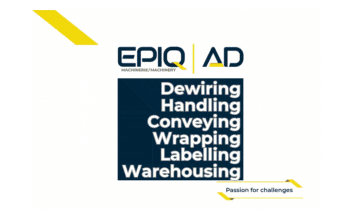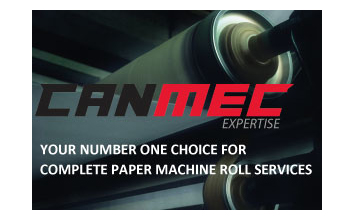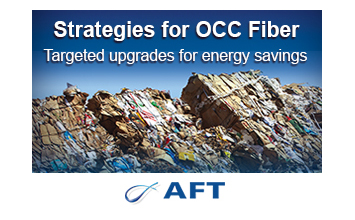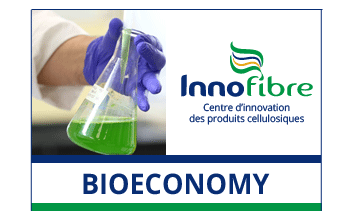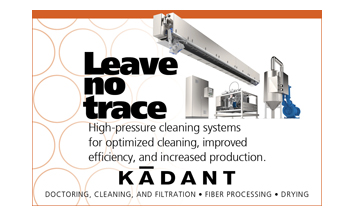DS Smith, a manufacturer of corrugated board packaging, has switched to using biobased adhesive in its refining process.
The transition to the new product went smoothly, and the company has been using Kiilto’s Pack Eco adhesive for several years now. With this change, both DS Smith and Kiilto are advancing their environmental goals.
Sustainability is an integral part of the circular economy business model of the corrugated board packaging manufacturer DS Smith. Kiilto also aims to be an environmental pioneer within its industry. The ambitious goals of the two companies require both strategic decisions and numerous changes in practices and processes, all aimed at progress toward environmental objectives. A good example of such a change is the adhesive used in the joint bonding of DS Smith’s corrugated board packaging refinement process, which was switched from a fossil-based option to the biobased Kiilto Pro Pack Eco adhesive.
“The transition to using the biobased adhesive went smoothly, and the product has been a good fit for our processes,” says Katja Viitala, Operations Excellence Manager at DS Smith.
The suggestion to switch to the biobased adhesive came from Kiilto.
“We developed the Kiilto Pro Pack Eco adhesive with the needs of the paper and packaging industry in mind. The adhesive matches the properties of comparable, non-biobased products, and it does not require any changes to the customer’s production process. With this product, the customer can easily switch to a more environmentally sustainable option without compromising quality or process efficiency”, says Kiilto Regional Manager Topias Heinisuo.
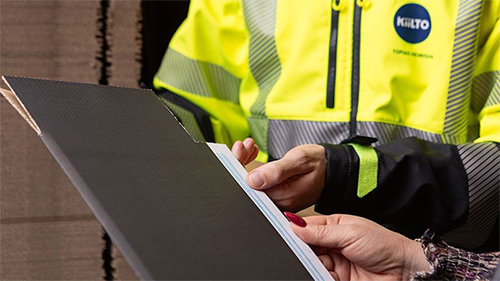 Kiilto Pro Pack Eco adhesive matches the properties of non-biobased comparator products, and its adoption does not require any changes to the customer’s production process.
Kiilto Pro Pack Eco adhesive matches the properties of non-biobased comparator products, and its adoption does not require any changes to the customer’s production process.
Adhesive bonding is part of the corrugated board packaging manufacturing process
Over more than ten years, Kiilto and DS Smith have built a strong partnership on the cornerstones of openness, transparency, and proactiveness.
“Thanks to our longstanding partnership, Kiilto is familiar with our machinery and processes, so their team can provide us with technical support and new ideas for the use of adhesives when needed. And we expect Kiilto, with its expertise, to contribute to the smoothness of the adhesive processes,” Viitala says.
Adhesive bonding is one of the components of DS Smith’s corrugated board product manufacturing process. In packages where an adhesive bond is required, it is essential that the bonding process goes smoothly and that the results are durable. If there are problems in the adhesive process, the machines can come to a standstill and the plant may not be able to manufacture the products at all. On the other hand, if the adhesive bonding of the finished product cannot be relied on, the finished product may not meet the customer’s quality expectations.
“Kiilto’s delivery reliability is good, and the adhesives perform as they should,” Viitala says.
The transition to biobased adhesive has been made easy
Adhesive accounts for only a few percent of the total weight in DS Smith’s corrugated board packaging, but annually, tonnes of adhesive are used in DS Smith’s Finnish factories as a whole. For this reason, the transition to biobased adhesive is not environmentally insignificant.
“In biobased adhesives, fossil-based raw materials are replaced with renewable raw materials. Renewable raw materials can include materials that would otherwise go unused. Examples of such materials include side streams from the forest industry,” says Heinisuo.
Efforts are being made to increase the use of environmentally less burdensome renewable raw materials in adhesives, for example through mass balance calculations. This means that the factory producing the raw material introduces renewable, biobased feedstocks into its process alongside the existing fossil-based ones. As a result, they obtain biobased raw materials that can be computationally distinguished from fossil-based ones.
“The concept is similar to wind energy, for instance. Mass balance calculations allow existing production facilities to be used for the manufacture of biobased products, eliminating the need to build new production facilities,” explains Heinisuo.
Kiilto supplies DS Smith with biobased Kiilto Pro Pack Eco adhesive, which is manufactured using mass balance calculations. The transition has been extremely easy to make, as the adhesives produced using mass balance calculations are chemically and physically equivalent to fossil-based adhesives.
“The change has not required any adjustments to the customer’s process. The only thing that has changed is that the adhesive now contains a significantly higher amount of biobased materials,” says Heinisuo.
Corrugated board of the future might be made from seaweed or daisies
DS Smith Group is continuously conducting research to explore alternative fibre materials beyond conventional wood fibre for corrugated board packaging. In the future, the company may manufacture corrugated boards using materials such as seaweed, daisies, or straw in addition to wood fibre.
“To lead the transition to a low-carbon circular economy, we need to be able to think outside the box. This applies to both the latest innovations and smaller areas of development. Little by little, a little becomes a lot,” Viitala says.
Source: Kiilto






